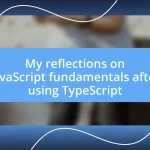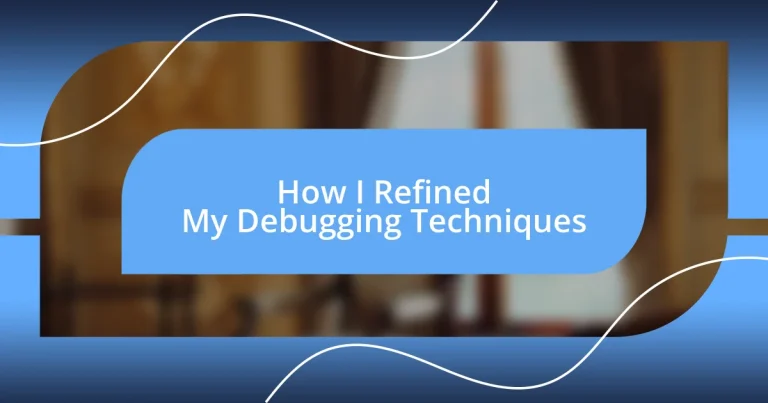Key takeaways:
- Developing a systematic approach through checklists, documentation, and collaboration can greatly enhance debugging efficiency and problem-solving skills.
- Utilizing debugging tools like IDEs and logging helps identify issues more effectively, turning complex problems into manageable tasks.
- Reflecting on past experiences and maintaining a mindset of curiosity fosters continuous improvement and deeper understanding of debugging challenges.
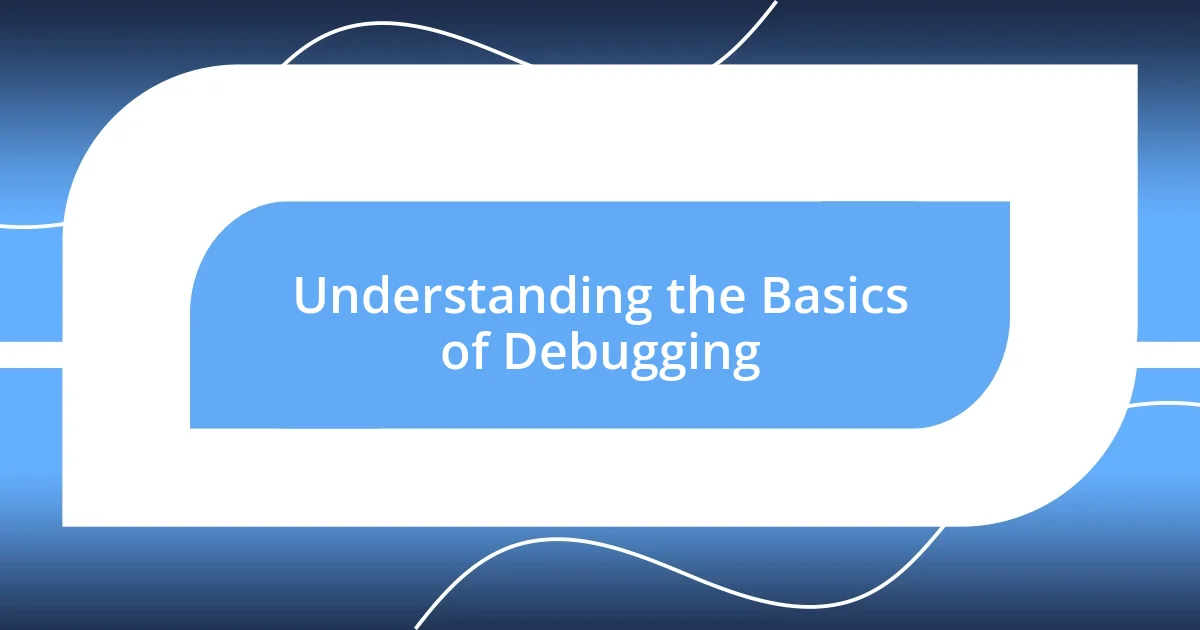
Understanding the Basics of Debugging
Debugging is, at its core, the process of identifying and correcting errors in code. It can often feel like being a detective, piecing together clues to uncover what went wrong. I remember the very first bug I encountered in my coding journey; it was a simple typo, but fixing it felt like solving a mystery, a triumph!
Understanding the basics requires a solid foundation in both the language you’re using and the tools at your disposal. Have you ever felt overwhelmed when a program doesn’t behave as expected? I certainly have. The frustration can be palpable, but digging into error messages and using breakpoints can turn that despair into a learning opportunity, allowing me to visualize exactly what’s happening in my code at crucial moments.
Debugging isn’t just about fixing issues; it’s also about developing a mindset that embraces curiosity and perseverance. When I first struggled with a particularly stubborn bug, I learned to treat each failed attempt as a stepping stone rather than a setback. Isn’t it rewarding to experience that “aha” moment when everything clicks? Crafting an effective debugging strategy transforms every error into a chance to grow as a programmer, and for me, that shift in perspective has been invaluable.
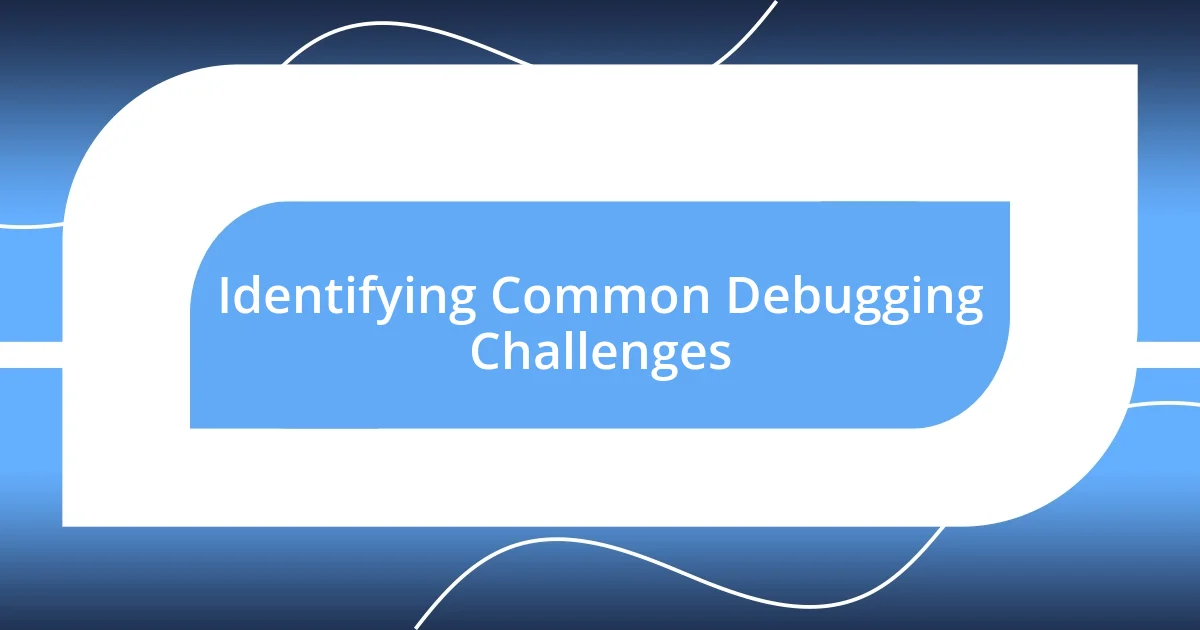
Identifying Common Debugging Challenges
Identifying common debugging challenges requires a keen eye to spot recurring patterns. I’ve experienced the frustration of the same bug rearing its head multiple times, often stemming from overlooked details. It’s surprising how an overlooked variable can lead to hours of head-scratching. I’ve learned that acknowledging these challenges is the first step to conquering them.
Some prevalent debugging challenges include:
– Code Overcomplication: When code becomes convoluted, it obscures the root of issues.
– Inconsistent Environments: Bugs may appear in one environment but not another, leading to confusion.
– Misleading Error Messages: Sometimes, the message isn’t helpful, or it sends you down a rabbit hole.
– Assumptions: Assuming that the last change was negligible can lead to major pitfalls.
– Ignoring Edge Cases: Overlooking rare conditions can result in unexpected failures during runtime.
Each of these challenges has pushed me to refine my approach, ultimately transforming them into valuable lessons in my debugging journey.
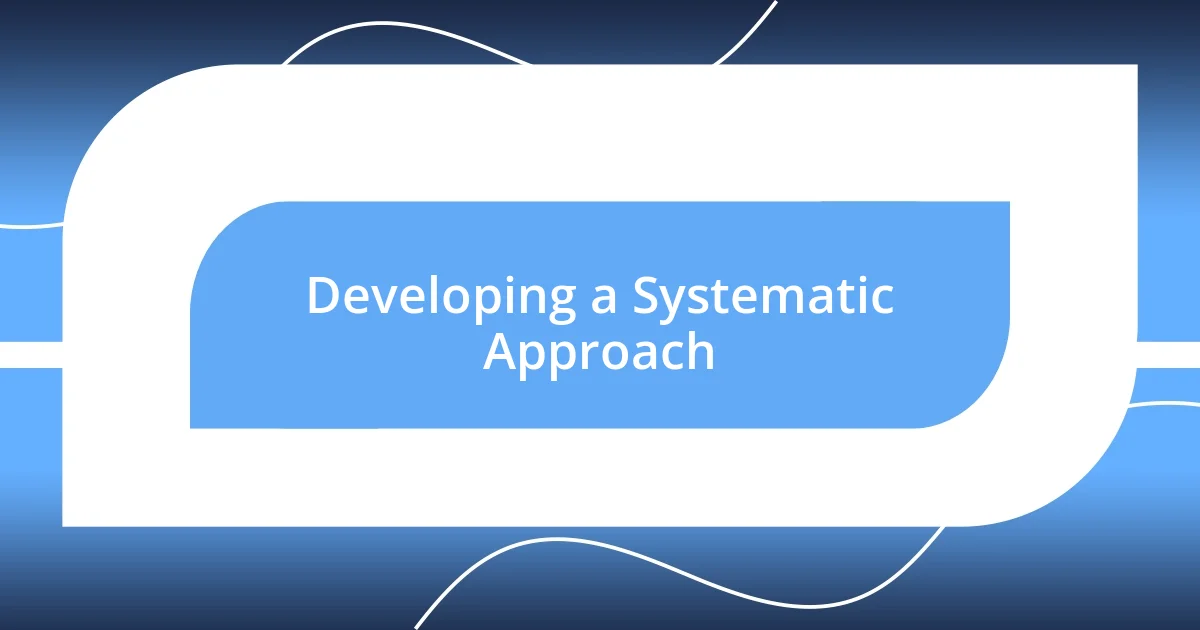
Developing a Systematic Approach
Developing a systematic approach to debugging can significantly enhance the efficiency of troubleshooting code. Early on, I learned the importance of creating a checklist to guide my process. Whenever I face a bug, I methodically walk through steps—checking syntax, reviewing variable scopes, and validating logic flows. This routine often feels like revisiting familiar territory, but it’s in that familiarity that I find clarity. Have you ever worked through a methodical list and realized the solution was hiding in plain sight? It’s an excellent reminder that sometimes, systematic steps can illuminate the path forward.
Additionally, documenting my debugging process has been a game changer. Whenever I encounter an issue, I jot down the symptoms, potential causes, and resolution steps. I recall a time I struggled with a network timeout error, and by trailing my thoughts on paper, I traced the issue back to a misconfigured API endpoint. Writing it down created a narrative that turned chaos into order, making me feel empowered rather than defeated. In moments like these, I reflect on how vital it is to translate confusion into a coherent map of understanding.
As I reflect on my growth in debugging, I can’t help but appreciate the role of collaboration. Partnering with fellow developers has introduced fresh perspectives; those conversations often spark new insights. I recall discussing a recurring problem with a colleague who suggested pair programming. This practice allowed us to approach the bug from multiple angles, and it reinforced my conviction that sharing experiences leads to richer solutions. Have you experienced this collaborative spark in solving complex problems? It’s a beautiful reminder that teamwork can profoundly improve our debugging techniques.
| Systematic Approach | Description |
|---|---|
| Checklist Method | Creating a structured list to guide the debugging process. |
| Documentation | Writing down symptoms, causes, and solutions enhances clarity and reflects learning. |
| Collaboration | Partnering with others for fresh perspectives often leads to quicker resolutions. |
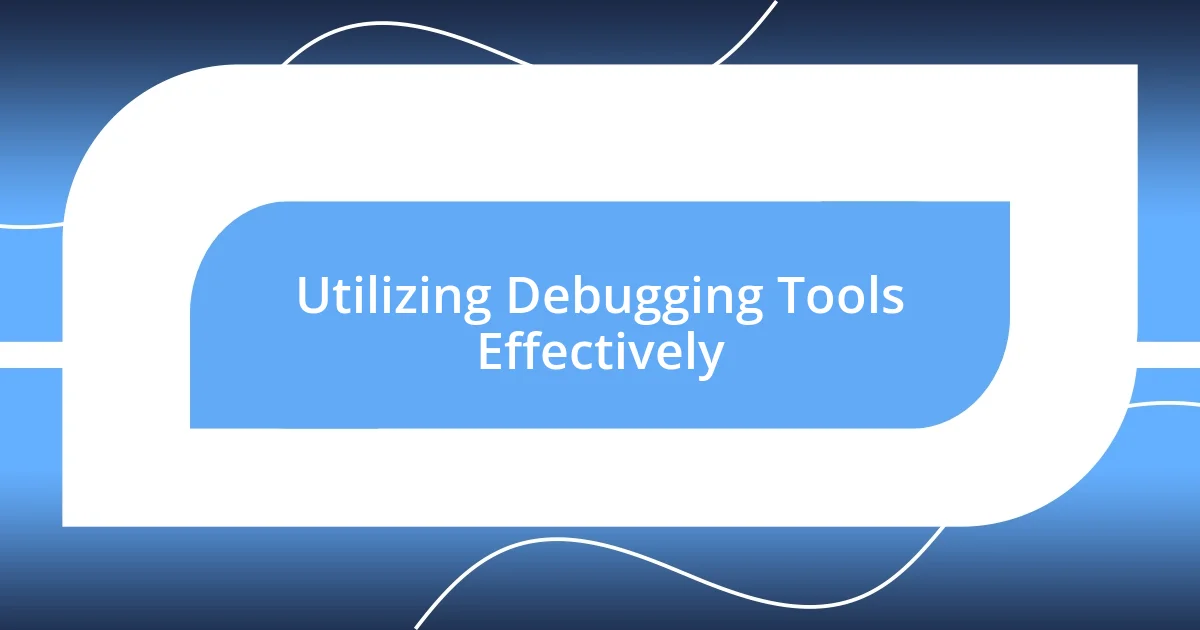
Utilizing Debugging Tools Effectively
Utilizing debugging tools effectively has become a crucial part of my workflow. I’ve found that employing integrated development environments (IDEs) with robust debugging features can save me hours of frustration. For instance, I once misdiagnosed a bug that involved incorrect variable values; by utilizing breakpoint debugging, I was able to pause the execution and inspect the variable states directly. It was like having a magnifying glass on my code, making those elusive errors much easier to identify.
Another aspect I’ve really come to appreciate is the power of logging. By strategically placing logs throughout my code, I can create a breadcrumb trail that reveals the program’s flow. There was an instance when my application crashed unexpectedly, but thanks to thorough logging, I identified a logical error that popped up when processing a specific input case. It’s fascinating how a few well-placed log statements can illuminate paths where shadows once lingered. Have you considered how logs could be your ally in navigating through complex issues?
Finally, I also advocate for exploring community resources, like forums and debugging guides. They can provide insights that tools alone may not capture. I remember grappling with a particularly challenging segmentation fault, and a quick search led me to a community discussion that clarified my misunderstanding of memory management. Engaging with these resources not only resolved my issue but enriched my understanding overall. Have you tapped into the wisdom of the community during your debugging journey? It often feels like a collective effort, with each shared insight adding to a pool of knowledge we can all draw from.
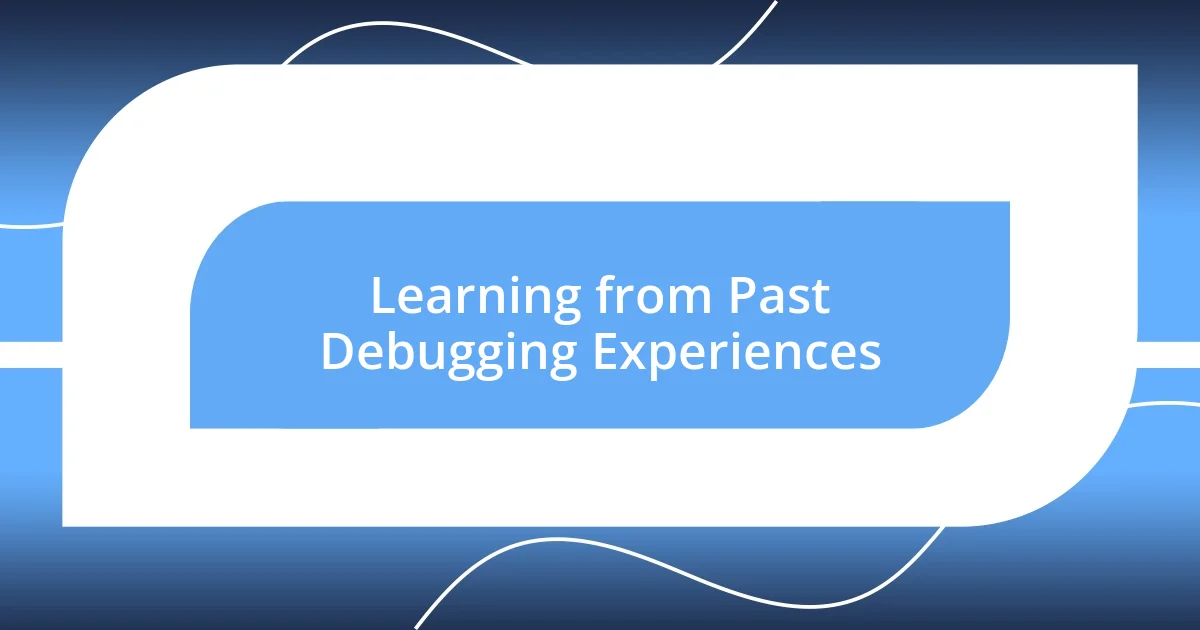
Learning from Past Debugging Experiences
Reflecting on past debugging experiences has taught me invaluable lessons that shaped my current techniques. I once spent an entire afternoon wrestling with an elusive bug—only to discover later that I had overlooked a simple typo in a variable name. This experience wasn’t just a case of wasted time; it sparked a realization about the importance of patience and attention to detail. Isn’t it fascinating how one small mistake can turn a seemingly straightforward task into a challenging puzzle? I now approach each line of code with a newfound respect, knowing that clarity can often reside in the smallest of details.
Another poignant moment came when I faced a persistent bug that would cause my application to crash under specific conditions. Initially, I felt overwhelmed and frustrated, but I decided to document every finding meticulously. Capturing each experiment and outcome transformed my chaotic thoughts into a structured narrative. Through this process, I unearthed a pattern that had eluded me before. This taught me that documentation is not just a record—it’s a powerful tool for evolution in problem-solving. Have you ever found clarity in the chaos by writing down your thoughts? It’s amazing how revisiting those records can lead to breakthroughs you didn’t see back then.
Finally, lessons learned through collaboration have been instrumental in refining my debugging approach. I remember teaming up with a fellow programmer during a hackathon and our lively discussion around a stubborn issue opened a floodgate of ideas. Their perspective helped me see the problem from an angle I hadn’t considered, and we quickly devised a solution that felt like a collective victory. Genuine collaboration fosters a rich exchange of ideas—have you ever had that “aha” moment where another person’s insight illuminated your path? I’ve come to view partnerships not just as helpful; they’re essential in the evolving landscape of debugging.
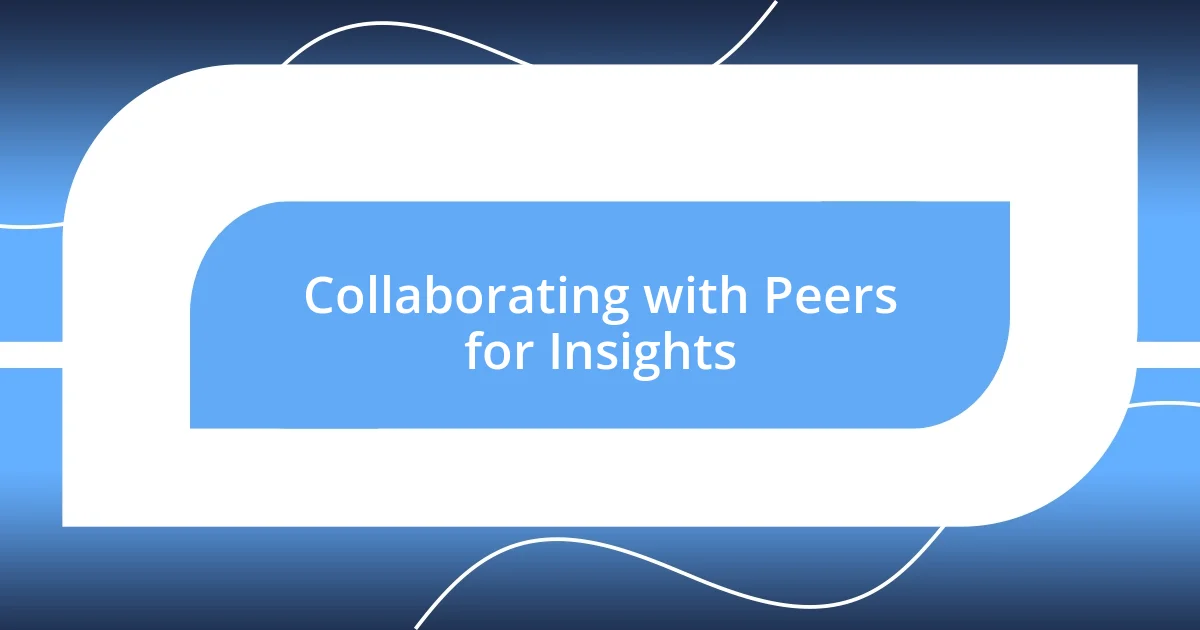
Collaborating with Peers for Insights
Collaborating with peers has profoundly enhanced my debugging techniques. I vividly remember sitting with a colleague over coffee, dissecting a particularly stubborn bug that had me stumped for days. Discussing it out loud enabled me to verbalize my thought process, and just like that, they pointed out an overlooked detail. It was a simple oversight—nothing major, yet it led to a solution. Have you ever found that just talking about a problem can shine a light on the answers hiding in plain sight?
There’s something incredibly rewarding about sharing insights with fellow developers. During a recent team sprint, we held a brainstorming session where each person presented their toughest debugging challenges. The variety of perspectives was a wealth of knowledge; it sparked ideas I’d never considered. For example, one teammate’s approach to isolating issues by chunking code made me rethink how I tackled my own problems. It was a reminder that collaboration not only provides answers but also breeds creativity. Have you experienced that epiphany when integrating others’ strategies into your own workflow?
Additionally, I’ve learned that vulnerability in collaboration is just as important as technical skill. During an intense debugging session, I hesitated to ask for help, thinking I should have the answers. But when I finally reached out, I discovered my teammates were equally invested in mutual success. They shared their struggles too, and we formed a bond that went beyond problem-solving. In that moment, I realized that embracing imperfections allows for richer collaboration. How might your own experiences change if you openly shared your debugging hurdles with others?
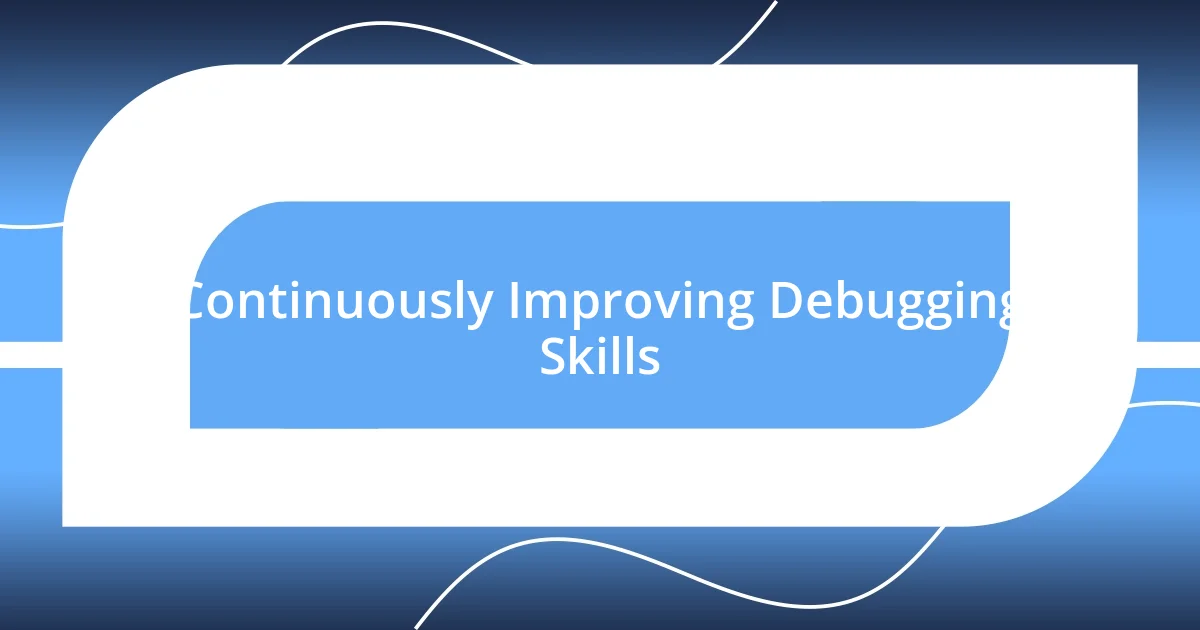
Continuously Improving Debugging Skills
One of the keys to continuously improving my debugging skills has been embracing a mindset of curiosity. I recall a particularly intricate bug that led to countless hours of frustration. Instead of succumbing to defeat, I began treating each bug like a riddle waiting to be solved. This shift in perspective transformed how I approached challenges—no longer do I just seek the fastest escape route, but rather, I delve deep to uncover the how and why behind the problem. Doesn’t it feel empowering to see each obstacle as an opportunity for exploration?
I also make it a habit to revisit my previous debugging endeavors. This practice often feels like a treasure hunt; what I’ve learned from old challenges can frequently illuminate new paths in my work. For example, I recently stumbled upon an ancient project of mine where I once grappling with event-handling code. As I reviewed my older notes, I was surprised to find ideas that I had completely forgotten. That rediscovery not only rejuvenated my current project but also reminded me of my growth over time. Have you ever unearthed wisdom from your past work that helped you in unexpected ways?
Lastly, I’ve found that setting aside time for self-reflection after each debugging session enhances my learning process immensely. Reflecting on what worked and what didn’t has become a ritual for me—it’s like a debrief for my coding brain. I remember a time when I finished debugging a critical feature just before a deadline. Though I was tempted to rush into the next task, I paused to jot down my thoughts on the methods that proved effective. That simple act of reflection revealed areas for improvement and armed me with better strategies for future bugs. How often do we take that moment to reflect when every second is precious? Making time for this introspection can be a game changer in honing our skills.






